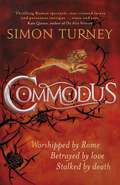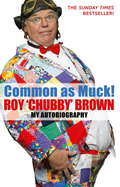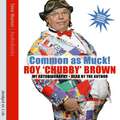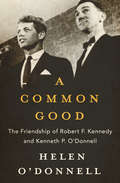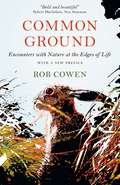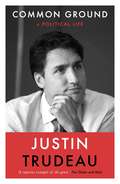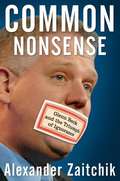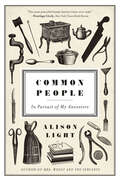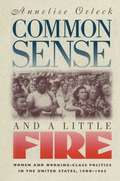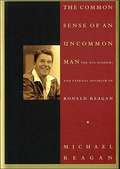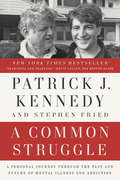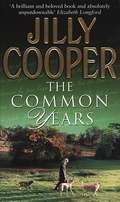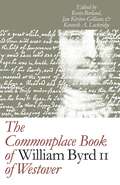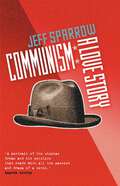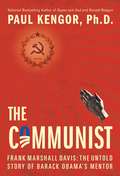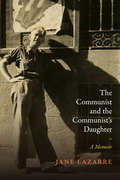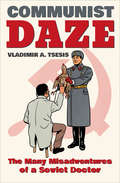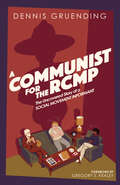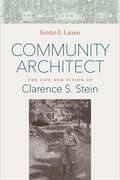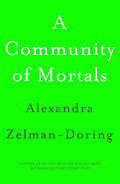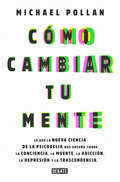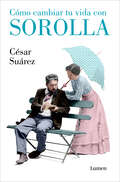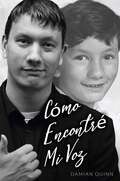- Table View
- List View
Commodus: The Damned Emperors Book 2 (The\damned Emperors Ser.)
by Simon TurneyRome is enjoying a period of stability and prosperity. The Empire's borders are growing, and there are two sons in the imperial succession for the first time in Rome's history. But all is not as it appears. Cracks are beginning to show. Two decades of war have taken their toll, and there are whispers of a sickness in the East. The Empire stands on the brink of true disaster, an age of gold giving way to one of iron and rust, a time of reason and strength sliding into hunger and pain.The decline may yet be halted, though. One man tries to hold the fracturing empire together. To Rome, he is their emperor, their Hercules, their Commodus.But Commodus is breaking up himself, and when the darkness grips, only one woman can hold him together. To Rome she was nothing. The plaything of the emperor. To Commodus, she was everything. She was Marcia.
Common As Muck!: The Autobiography of Roy 'Chubby' Brown
by Roy Chubby BrownBy the time he was nineteen, Royston Vasey had married, divorced, fathered two children, spent two years in Britain's toughest Borstal, served three prison stretches and been stabbed while in the Merchant Navy. He thought his only career choice would be a life of crime. Fifteen years later, he was one of Britain's most successful comics, playing live to half a million fans a year as Roy 'Chubby' Brown. COMMON AS MUCK! tells an incredible story of hardships, heartbreak and, ultimately, success. From an impoverished childhood with his abusive father, to his brand of comedy too rude for television and his determined fight against throat cancer, COMMON AS MUCK! is a frank telling of a remarkable life, laced with Roy's irrepressible humour.
Common As Muck!: The Autobiography of Roy 'Chubby' Brown
by Roy Chubby BrownBy the time he was nineteen, Royston Vasey had married, divorced, fathered two children, spent two years in Britain's toughest Borstal, served three prison stretches and been stabbed while in the Merchant Navy. He thought his only career choice would be a life of crime. Fifteen years later, he was one of Britain's most successful comics, playing live to half a million fans a year as Roy 'Chubby' Brown. COMMON AS MUCK! tells an incredible story of hardships, heartbreak and, ultimately, success. From an impoverished childhood with his abusive father, to his brand of comedy too rude for television and his determined fight against throat cancer, COMMON AS MUCK! is a frank telling of a remarkable life, laced with Roy's irrepressible humour.
Common As Muck!: The Autobiography of Roy 'Chubby' Brown
by Roy Chubby BrownAbandoned by his mother when he was just nine years old, by the time Royston Vasey was nineteen he had been married, divorced, had two children, spent two years in Borstal and several months in prison, and had been shot at in the Merchant Navy. By the time he was thirty-five, he was one of Britain's most successful comics, playing live to half a million fans a year as Roy 'Chubby' Brown. In Common as Muck he tells his incredible story. Frank, funny and - perhaps unexpectedly - often moving, it is a tale of a man battling to escape his background and become a star. From his impossibly deprived childhood to his controversial comic persona to his more recent battle against throat cancer, Roy 'Chubby' Brown's life is as remarkable and fascinating as the man himself.
A Common Good: The Friendship of Robert F. Kennedy and Kenneth P. O'Donnell
by Helen O'DonnellAn illuminating account of the history-making friendship between RFK and the chief of staff to JFK—a bond built on shared ideals, but severed by tragedy. When they first met at Harvard in 1946, young Bobby Kennedy and Kenny O&’Donnell could not have imagined where their lives would take them. Teammates on both the football and debate teams, they formed a partnership that would sustain them through the years, from Robert Kennedy&’s tenure as attorney general to O&’Donnell&’s years as John F. Kennedy&’s chief of staff. Together they lived, worked, and struggled through some of the most pivotal moments of the twentieth century, including the assassination of JFK in Dallas. Their harmonious relationship was cut short only by Bobby&’s own tragic death. With full access to the Kennedy family archives, Helen O&’Donnell brings an inspiring personal and political alliance to life. With A Common Good, she amply fulfills the promise she made to her late father to honor and preserve his memories of Robert F. Kennedy for future generations. Kirkus Reviews hails A Common Good as &“a moving and intimate study of a unique friendship but also of the time and place, now long ago, in which this friendship formed and blossomed.&” O&’Donnell &“set out to write &‘a good book about two good men.&’ In this she has succeeded.&”
Common Ground: Encounters with Nature at the Edges of Life
by Rob CowenAll too often, we think of nature as something distinct from ourselves, something to go and see, a place that’s separate from the ordinary modern world in which we live and work. But if we take the time to look, we soon find that’s not how nature works. Even in our parceled-out, paved-over urban environs, nature is all around us; it is in us. It is us. That’s what Rob Cowen discovered after moving to a new home in northern England. After ten years in London he was suddenly adrift, searching for a sense of connection. He found himself drawn to a square-mile patch of waste ground at the edge of town. Scrappy, weed-filled, this heart-shaped tangle of land was the very definition of overlooked—a thoroughly in-between place that capitalism no longer had any use for, leaving nature to take its course. Wandering its meadows, woods, hedges, and fields, Cowen found it was also a magical, mysterious place, haunted and haunting, abandoned but wildly alive—and he fell in fascinated love. Common Ground is a true account of that place and Cowen’s transformative journey through its layers and lives, but it’s much more too. As the land’s stories intertwine with events in his own life—and he learns he is to become a father for the first time—the divisions between human and nature begin to blur and shift. The place turns out to be a mirror, revealing what we are, what we’re not and how those two things are ultimately inseparable. This is a book about discovering a new world, a forgotten world on the fringes of our daily lives, and the richness that comes from uncovering the stories and lives—animal and human—contained within. It is an unforgettable piece of nature writing, part of a brilliant tradition that stretches from Gilbert White to Robert Macfarlane and Helen Macdonald. “I am dreaming of the edge-land again,” Cowen writes. Read Common Ground, and you, too, will be dreaming of the spaces in between, and what—including us—thrives there.
Common Ground: A Political Life
by Justin TrudeauJustin Trudeau&’s candid memoir reveals for the first time the experiences that have shaped him over the course of his life, revealing how his passion for politics took root. From his childhood at the prime ministerial residence of 24 Sussex to his leadership of the Liberal party, Trudeau captures the formative moments of his upbringing, including the influence of his father, Pierre, who was prime minister before him, and the tragic death of his brother, Michel. Filled with anecdotes, personal reflections, and never-before-seen photographs from his own collection, Common Ground is an intimate portrait of the man who has thrust Canada back onto the world stage. Not only this, but it also presents a moving case for a better kind of politics at a time when people are more disillusioned with politics than ever before.
Common Nonsense: Glenn Beck and the Triumph of Ignorance
by Alexander ZaitchikWho is this guy and why are people listening? Forget Rush Limbaugh, Bill O'Reilly, and Sean Hannity--Glenn Beck is the right's new media darling and the unofficial leader of the conservative grassroots. Lampooned by the left and lionized by the far right, his bluster-and-tears brand of political commentary has commandeered attention on both sides of the aisle. Glenn Beck has emerged over the last decade as a unique and bizarre conservative icon for the new century. He fantasizes aloud about killing his political opponents and encourages his listeners to embrace a cynical paranoia that slides easily into a fantasyland filled with enemies that do not exist, and solutions that are incoherent, at best. Since the election of Barack Obama, Beck's bombastic, conspiratorial, and often viciously personal approach to political combat has made him one of the most controversial figures in the history of American broadcasting. In Common Nonsense, investigative reporter Alexander Zaitchik explores Beck's strange brew of ratings lust, boundless ego, conspiratorial hard-right politics, and gimmicky morning-radio entertainment chops. Separates the facts from the fiction, following Beck from his troubled childhood to his recent rise to the top of the conservative media heap. Zaitchik's recent three-part series in Salon caused so much buzz, Beck felt the need to attack it on his show. Based on Zaitchik's interviews with former Beck coworkers and review of countless Beck writings and television and radio shows. Examines Beck's high-profile obsessions (Acorn and Van Jones) as well as his lesser-known influences (obscure Mormon radicals like Cleon Skousen.) Zaitchik's writing has appeared in the New Republic, the Nation, Salon, Wired, the New York Times, and AlternetBeck, a perverse and high-impact media spectacle, has emerged as a leader in a conservative protest movement that raises troubling questions about the health of American democracy.
Common People: In Pursuit of My Ancestors
by Alison Light"Family history begins with missing persons," Alison Light writes in Common People. We wonder about those we've lost, and those we never knew, about the long skein that led to us, and to here, and to now. So we start exploring. Most of us, however, give up a few generations back. We run into a gap, get embarrassed by a ne'er-do-well, or simply find our ancestors are less glamorous than we'd hoped. That didn't stop Alison Light: in the last weeks of her father's life, she embarked on an attempt to trace the history of her family as far back as she could reasonably go. The result is a clear-eyed, fascinating, frequently moving account of the lives of everyday people, of the tough decisions and hard work, the good luck and bad breaks, that chart the course of a life. Light's forebears--servants, sailors, farm workers--were among the poorest, traveling the country looking for work; they left few lasting marks on the world. But through her painstaking work in archives, and her ability to make the people and struggles of the past come alive, Light reminds us that "every life, even glimpsed through the chinks of the census, has its surprises and secrets. " What she did for the servants of Bloomsbury in her celebrated Mrs. Woolf and the Servants Light does here for her own ancestors, and, by extension, everyone's: draws their experiences from the shadows of the past and helps us understand their lives, estranged from us by time yet inextricably interwoven with our own. Family history, in her hands, becomes a new kind of public history.
Common Sense and a Little Fire
by Annelise OrleckThis book has its roots in the memories and stories of my grandmother, Lena Orleck, a sharp-tongued woman with a talent for survival and for dominating every she met.
Common Sense of an Uncommon Man
by Jim Denney Michael ReaganSome say Ronald Reagan was the greatest president of our century. He rescued America from economic collapse and ended the cold war. He toppled the Soviet "Evil Empire" without firing a shot. Now his son, Michael Reagan -- the most listened-to nighttime talk show host -- takes you on a tour of the heart and mind of our fortieth president. Funny, inspiring, and warmly nostalgic, The Common Sense of an Uncommon Man is filled with photographs covering the span of Ronald Reagan's life. This enduring keepsake will be treasured forever by all who honor Ronald Reagan, cherish freedom, and love our American way of life.
A Common Struggle: A Personal Journey Through the Past and Future of Mental Illness and Addiction
by Stephen Fried Patrick J. Kennedy**A New York Times Bestseller**Patrick J. Kennedy, the former congressman and youngest child of Senator Ted Kennedy, details his personal and political battle with mental illness and addiction, exploring mental health care's history in the country alongside his and every family's private struggles.On May 5, 2006, the New York Times ran two stories, "Patrick Kennedy Crashes Car into Capitol Barrier" and then, several hours later, "Patrick Kennedy Says He'll Seek Help for Addiction." It was the first time that the popular Rhode Island congressman had publicly disclosed his addiction to prescription painkillers, the true extent of his struggle with bipolar disorder and his plan to immediately seek treatment. That could have been the end of his career, but instead it was the beginning. Since then, Kennedy has become the nation's leading advocate for mental health and substance abuse care, research and policy both in and out of Congress. And ever since passing the landmark Mental Health Parity and Addiction Equity Act--and after the death of his father, leaving Congress--he has been changing the dialogue that surrounds all brain diseases.A Common Struggle weaves together Kennedy's private and professional narratives, echoing Kennedy's philosophy that for him, the personal is political and the political personal. Focusing on the years from his 'coming out' about suffering from bipolar disorder and addiction to the present day, the book examines Kennedy's journey toward recovery and reflects on Americans' propensity to treat mental illnesses as "family secrets."Beyond his own story, though, Kennedy creates a roadmap for equality in the mental health community, and outlines a bold plan for the future of mental health policy. Written with award-winning healthcare journalist and best-selling author Stephen Fried, A Common Struggle is both a cry for empathy and a call to action. From the Hardcover edition.
The Common Years
by Jilly Cooper OBEDuring the ten years she lived at the edge of Putney Common Jilly Cooper walked daily on this expanse of green. For most of the time she lived there she kept a diary, noting the effects of the changing seasons and writing about her encounters with dogs and humans. The book is a distillation of those diaries: an affectionate and enthralling portrait - warts and all - of life on Putney Common. Never has Jilly Cooper written more lyrically about flowers, trees, birds and the natural world; more tellingly about the sorrows - as well as the joys - of caring for dogs and children; or more outrageously about the gossip, illicit romances and jealousies of life in a small community.
The Commonplace Book of William Byrd II of Westover
by Kevin Joel Berland Kenneth A. Lockridge Jan Kirsten GilliamWilliam Byrd II (1674-1744) was an important figure in the history of colonial Virginia: a founder of Richmond, an active participant in Virginia politics, and the proprietor of one of the colony's greatest plantations. But Byrd is best known today for his diaries. Considered essential documents of private life in colonial America, they offer readers an unparalleled glimpse into the world of a Virginia gentleman. This book joins Byrd's Diary, Secret Diary, and other writings in securing his reputation as one of the most interesting men in colonial America. Edited and presented here for the first time, Byrd's commonplace book is a collection of moral wit and wisdom gleaned from reading and conversation. The nearly six hundred entries range in tone from hope to despair, trust to dissimulation, and reflect on issues as varied as science, religion, women, Alexander the Great, and the perils of love. A ten-part introduction presents an overview of Byrd's life and addresses such topics as his education and habits of reading and his endeavors to understand himself sexually, temperamentally, and religiously, as well as the history and cultural function of commonplacing. Extensive annotations discuss the sources, background, and significance of the entries.
Communism: A Love Story
by Jeff SparrowFor more than seventy years, idealists and rebels of all stripes saw in the Communist Party the best hope for a world remade. Who were the people who dedicated themselves to that beautiful dream? How did they experience its shimmering promise - and cope with its shattering collapse? This is the story of Guido Baracchi, the playboy and dilettante who experienced communism at its best - and its very worst. His love affair with Marxism took him from his father's astronomical observatory to the rough halls of the legendary Wobblies. He debated Bob Menzies at the University of Melbourne; he wooed novelist Katharine Susannah Prichard on a luxury ocean liner; he belonged to illegal organisations in two world wars. The Sun dubbed him 'Melbourne's Lenin', and ASIO classified him 'a person of bad moral character and violent and unstable political views'. From Weimar Germany to Stalin's Russia, from Melbourne's Pentridge gaol to the bohemian colony of Montsalvat, Baracchi entwined political intrigue with a series of tempestuous romances with poets, artists and playwrights. Yet communism remained his real love and communism broke his heart - in a betrayal that still resonates in the political choices available today.
The Communist: The Untold Story of Barack Obama's Mentor
by Paul Kengor"I admire Russia for wiping out an economic system which permitted a handful of rich to exploit and beat gold from the millions of plain people. . . . As one who believes in freedom and democracy for all, I honor the Red nation." --FRANK MARSHALL DAVIS, 1947. In his memoir, Barack Obama omits the full name of his mentor, simply calling him "Frank." Now, the truth is out: Never has a figure as deeply troubling and controversial as Frank Marshall Davis had such an impact on the development of an American president.
The Communist and the Communists Daughter: A Memoir
by Jane LazarreIn a letter to his baby grandson, Bill Lazarre wrote that "unfortunately, despite the attempts by your grandpa and many others to present you with a better world, we were not very successful." Born in 1902 amid the pogroms in Eastern Europe, Lazarre dedicated his life to working for economic equality, racial justice, workers' rights, and a more just world. He was also dedicated to his family, especially his daughters, whom he raised as a single father following his wife’s death. In The Communist and the Communist's Daughter Jane Lazarre weaves memories of her father with documentary materials—such as his massive FBI file—to tell her father's fascinating history as a communist, a Jew, and a husband, father, and grandfather. Soon after immigrating to the United States as a young man, Lazarre began a long career as a radical activist, being convicted of sedition, holding leadership positions in the American Communist Party, fighting in the Spanish Civil War, organizing labor unions, testifying in front of the House Un-American Activities Committee, and resisting the FBI’s efforts to recruit him as an informant. Through periods of heroism and deep despair Lazarre never abandoned his ideals or his sustained faith in the fundamental goodness of people. This is also the story of Jane as she grew up, married an African American civil rights activist, and became a mother and a writer while coming to terms with her father’s legacy. She recounts her arguments with her father over ideology, but also his profound influence on her life. Throughout this poignant and beautifully written work, Jane examines memory, grief, love, and conscience while detailing the sacrifices, humanity, and unwavering convictions of a man who worked tirelessly to create a brighter future for us all.
Communist Daze: The Many Misadventures of a Soviet Doctor
by Vladimir A. TsesisThis darkly comic memoir &“reveal[s] much about the poverty, drunkenness, political corruption, anti-Semitism, and fundamental absurdity of rural life in the Soviet 1960s&” (Deborah A. Field author of Private Life and Communist Morality in Khrushchev&’s Russia). Welcome to Gradieshti, a Soviet village awash in gray buildings and ramshackle fences, home to a large, collective farm and to the most oddball and endearing cast of characters possible. For three years in the 1960s, Vladimir Tsesis—inestimable Soviet doctor and irrepressible jester—was stationed in a village where racing tractor drivers tossed vodka bottles to each other for sport; where farmers and townspeople secretly mocked and tried to endure the Communist way of life; where milk for children, running water, and adequate electricity were rare; where the world&’s smallest, motley parade became the country&’s longest; and where one compulsively amorous Communist Party leader met a memorable, chilling fate. From a frantic pursuit of calcium-deprived, lunatic Socialist chickens to a father begging on his knees to Soviet officials to obtain antibiotic for his dying child, Vladimir&’s tales of Gradieshti are unforgettable. Sometimes hysterical, often moving, always a remarkable and highly entertaining insider&’s look at rural life under the old Soviet regime, they are a sobering exposé of the terrible inadequacies of its much-lauded socialist medical system. &“To understand the confusing reality of Russia today, it helps to recall the &‘bad old days&’ of the late, unlamented Soviet Union. This warm, touching and occasionally hilarious book can assist those recollections.&” —Michael Medved, nationally syndicated radio show host
A Communist for the RCMP: The Uncovered Story of a Social Movement Informant
by Dennis GruendingIn 1941, the RCMP recruited Frank Hadesbeck, a Spanish Civil War veteran, as a paid informant to infiltrate the Communist Party. For decades, he informed not only upon communists, but also upon hundreds of other people who held progressive views. Hadesbeck’s “Watch Out” lists on behalf of the Security Service included labour activists, medical doctors, lawyers, university professors and students, journalists, Indigenous and progressive farm leaders, members of the clergy, and anyone involved in the peace and human rights movements. Defying every warning given to him by his handlers, Hadesbeck kept secret notes. Using these notes, author Dennis Gruending recounts how the RCMP spied upon thousands of Canadians. Hadesbeck’s life and career are in the past, but RCMP surveillance continues in new guises. As Canada’s petroleum industry doubles down on its extraction plans in the oil sands and elsewhere, the RCMP and other state agencies provide support, routinely branding Indigenous land defenders and their allies in the environmental movement as potential terrorists. They share information and tactics with petroleum industry “stakeholders” in what has been described as a “surveillance web” intended to suppress dissent. A Communist for the RCMP provides an inside account of Hadesbeck’s career and illustrates how the RCMP uses surveillance of activists to enforce the status quo.
Community Architect: The Life and Vision of Clarence S. Stein
by Kristin E. LarsenClarence S. Stein (1882–1975) was an architect, housing visionary, regionalist, policymaker, and colleague of some of the most influential public figures of the early to mid-twentieth century, including Lewis Mumford and Benton MacKaye. Kristin E. Larsen's biography of Stein comprehensively examines his built and unbuilt projects and his intellectual legacy as a proponent of the "garden city" for a modern age. This examination of Stein’s life and legacy focuses on four critical themes: his collaborative ethic in envisioning policy, design, and development solutions; promotion and implementation of “investment housing;” his revolutionary approach to community design, as epitomized in the Radburn Idea; and his advocacy of communitarian regionalism. His cutting-edge projects such as Sunnyside Gardens in New York City; Baldwin Hills Village in Los Angeles; and Radburn, New Jersey, his “town for the motor age,” continue to inspire community designers and planners in the United States and around the world.Stein was among the first architects to integrate new design solutions and support facilities into large-scale projects intended primarily to house working-class people, and he was a cofounder of the Regional Planning Association of America. As a planner, designer, and, at times, financier of new housing developments, Stein wrestled with the challenges of creating what today we would term “livable,” “walkable,” and “green” communities during the ascendency of the automobile. He managed these challenges by partnering private capital with government funding, as well as by collaborating with colleagues in planning, architecture, real estate, and politics.
A Community of Mortals
by Alexandra Zelman-DoringWhat is it like to have someone die in your arms? Can we return from the dead? And why has nobody heard of therapeutic hypothermia? Forced to come to terms with doctors pronouncing her husband ‘clinically dead’, Alexandra Zelman-Doring embarks on an exploration of what death means to us and how we might face it. Initally she is overwhelmed by the difficulty of accepting the loss of a loved one, and the anger, sadness and sense of isolation that it brings. But her suffering pushes her towards a life-store of reading, and here she finds words with which to contemplate death; from Turgenev on death as an ‘unanswerable reproach’ to Norbert Elias on the extraordinary collective will to endure it.Equally inspiring are the true stories of unlikely survivors: from a species of frog whose organs stop, frozen, throughout the winter, only to stir back to life in the spring, to Anna Bagenholm whose iced brain and body held out against all odds after a fatal accident. These incidents inform a development in medical science where cardiac arrest is treated with ‘therapeutic hypothermia’, in some cases allowing the body to last without oxygen just long enough for doctors to return the near-dead to life.
Cómo cambiar tu mente: Lo que la nueva ciencia de la psicodelia nos enseña sobre la conciencia, la muerte, la adicción, la depresión y la transcendencia
by Michael PollanUna brillante y valiente investigación de Michael Pollan, autor de cinco best sellers de The New York Times, sobre la revolución médica y científica en torno a las drogas psicodélicas, y la fascinante historia de sus propias experiencias psicodélicas que le cambiaron la vida. Cuando Michael Pollan se propuso investigar por qué el LSD y la psilocibina (el ingrediente activo de las setas mágicas) brindaban un enorme alivio a las personas que padecían condiciones difíciles de tratar como el TEPT (trastorno por estrés postraumático), la depresión o la adicción, no tenía la intención de escribir lo que es indudablemente su libro más personal. Pero al descubrir cómo estas notables sustancias estaban mejorando la vida no solo de los pacientes con problemas de salud mental sino también de las personas que simplemente se enfrentaban a los altibajos de la vida cotidiana, decidió explorar los límites de la mente en primera y tercera persona. Así comenzó una singular aventura entorno a la experiencia de la conciencia alterada, así como una profunda inmersión en el estudio de la neurociencia más pionera y la toma de contacto con una prodigiosa comunidad subterránea de expertos psicodélicos. En esta ejemplar investigación periodística, Pollan revisa archivos históricos y documentos científicos para separar la verdad sobre estas misteriosas drogas de los mitos, la propaganda y el pánico moral que se ha ido acumulando desde los años sesenta, cuando un puñado de personajes rebeldes catalizaron una poderosa reacción contra lo que entonces era un prometedor campo de investigación. Sugerente, polémico y deslumbrante este libro es el resultado de un viaje a una nueva, emocionante e inesperada frontera de la percepción, de nuestra comprensión de la mente, del yo y de nuestro lugar en el mundo.
Cómo cambiar tu vida con Sorolla
by César Suárez2023: AÑO SOROLLA Una biografía única. Una mirada audaz sobre uno de los más grandes pintores españoles y su tiempo «Quien busque una biografía de Sorolla y de su época encontrará en este libro una novela apasionante y magníficamente escrita. Y quien busque una novela apasionante encontrará al mismo tiempo una biografía tan rigurosa como amena».Luis Landero, Premio Nacional de las Letras Españolas La obra de Joaquín Sorolla es una de las más populares de la historia del arte español. Paradójicamente, su apasionante vida es poco conocida. Requerido por las élites sociales e intelectuales de Europa y América, fue uno de los grandes artistas de su época, que triunfó en los salones de París y en la emergente Nueva York. Habitó el fascinante mundo de finales del siglo xix e inicios del XX, con el desarrollo de la modernidad y la llegada de los grandes inventos. Vivió el desenfreno de la Belle Époque, el Madrid de las tertulias y zarzuelas, y las tribulaciones de la generación del 98, que criticó la «alegría de vivir» de sus cuadros. Trabajador incansable, discreto, ambicioso y exigente consigo mismo, sus mayores deseos eran pintar a todas horas y estar con su familia. Su historia es la de un hombre de éxito que hubiera preferido una existencia anodina. Una vida extraordinaria con un final desgraciado. ¿Cómo se forjó su carácter? ¿De dónde provenía su don? ¿Cómo era la España que vio y plasmó en sus cuadros? ¿Cómo logró mantener vivo el amor por su mujer desde la adolescencia? César Suárez combina biografía, ensayo y ficción en este libro que muestra una visión audaz de Joaquín Sorolla y de su tiempo. Un recorrido por escenas de la vida del artista que, tal vez, podrían servirnos de inspiración para la nuestra. La crítica ha dicho:«Con solvencia documental y una dinámica prosa, César Suárez narra la vida de Joaquín Sorolla, un artista que disfrutó de un éxito descomunal al tiempo que padeció el desdén de algunos de sus contemporáneos. Un retrato fascinante».Elvira Lindo «Este libro original y atrevido consigue el milagro de aparecerse ante nosotros como un cuadro propio de Sorolla. En él hay dicha, sol y ganas de seguir viviendo».Manuel Jabois «El Sorolla familiar, el del éxito internacional, el conquistador de la luz mediterránea, el de la mano prodigiosa que sabía que lo más profundo del cuerpo es la piel. Toda esa sabiduría está en este libro de César Suárez».Manuel Vicent «De Sorolla creíamos saber todo hasta que César Suárez ha revelado lo mucho que quedaba por conocer de este pintor inagotable».Antonio Lucas «Mezcla biografía, ensayo y ficción y se lee como una novela. Cuenta la parte más emocional de la historia de un artista extraordinario en una época fascinante».Isabela Muñoz, Telva «Una nueva, cálida y valiente forma de ver a Joaquín Sorolla a través de sus emociones. Un canto a su vida y a su obra».Blanca Pons-Sorolla
Como é Azul o Meu Vale
by Jean Gill ViniciusO verdadeiro aroma da Provença? Lavanda, tomilho e fossa séptica. Há centenas de coisas interessantes a se fazer numa banheira, mas lavar pratos não é uma delas, nem algo que a escritora Jean Gill tinha em mente, ao trocar o seu vale em Gales por um vale francês. Ávida por escapar do estômago do elefante, aquela mescla de névoa cinza que em Gales chama-se de clima, ela ofereceu seu certificado de natação a um perplexo corretor de imóveis provençal e comprou uma casa com belas estrelas e com sua própria água de nascente. Ou melhor, como descoberto depois, a nascente de um vizinho, que é a única a abastecer a cozinha e que, de acordo com os gentis rapazes da companhia de água, está escoando a água suja de forma ilegal direto na rua principal... e há coisas piores... Mas como é que se pode resistir a uma vila chamada Dieulefit, “Deus a fez”, a vila “aonde todos pertencem”? Descubra a verdadeira Provença em boa companhia. “Ri em voz alta... uma imagem tão vívida dos campos de lavandas, girassóis e oliveiras que você se sente como se estivesse lá com ela.” Stephanie Sheldrake, Revista Living France
Cómo Encontré Mi Voz
by Damian Quinn"...las palabras siempre conservarán su poder. Las palabras ofrecen los medios para encontrar el significado y, para aquellos que escuchan, el enunciado de la verdad". - V, 2005 El poder de la comunicación es fundamental; algunos dirían que una necesidad. Todos tenemos ese poder: humanos, insectos, aves, gatos, perros, etc. No importa a cual especie pertenezcamos, todos nos comunicamos. Lamentablemente, a algunas personas se les dificulta, y Damian fue una de ellas. El Trastorno del Desarrollo del Lenguaje, una discapacidad del habla y del lenguaje que padece Damian desde su nacimiento, hace que las frases sean confusas y lentas, incluso si las ideas de Damian son claras. Aquí Damian habla acerca de cómo el TDL ha impactado su vida, y como la organización benéfica Afasic ha estado ahí para ayudarle durante todo el trayecto. Damian tropezó con muchas dificultades a lo largo de su vida para lograr hablar. Cómo encontré mi voz relata el viaje de Damian, desde sus primeros años, sus dificultades para encontrar un diagnóstico y que la enfermedad fuera reconocida, hasta ser escuchado como vicepresidente de Afasic.
